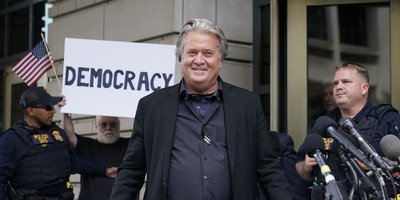In Part 1, I revealed how rational and rewarding it would be to post armed guards at our schools.
In Part 2, I showed how reducing the number of firearms in the U.S. would not curb violent crime.
Today and next week, I will discuss an age-old solution that America's Founding Fathers knew was key for maintaining civility in our communities -- a solution being mimicked by a few nonprofit organizations in our public schools.
Our founders knew that more government regulation and taking away guns from law-abiding citizens would not curb violent crime. And they didn't expect the law of the land to well up peace in people's hearts, either. As proud as they were of their new-found republic, they would rely instead upon personal core values to perpetuate decency, respect, morality, honesty and restraint, to name a few.
Our founders' "human values curriculum," if you will, consisted of two primary principles: 1) Human life has an intrinsic or inherent value esteemed far above the rest of creation. 2) Human life is to be respected and cared for via each person's accountability to moral absolutes (that is, a moral creed to which he confesses and clings). I will discuss the first point today and the second next week.
Most people's view and value of humanity were shaped around two beliefs: that God created us and that we were created equal.
Recommended
The book of Genesis says, "Then God said, 'Let Us make man in Our image, according to Our likeness'; And God created man in His own image, in the image of God He created him; male and female He created them."
That creed was codified in the Declaration of Independence:
"We hold these Truths to be self-evident, that all Men are created equal, that they are endowed by their Creator with certain unalienable Rights, that among these are Life, Liberty, and the Pursuit of Happiness."
The founders believed that equality eventually would give legs to everyone's freedom, though they themselves struggled with its execution as much as any generation -- with slavery and their treatment of Native Americans and women, for example.
John Adams, our second president, said, "We should begin by setting conscience free. When all men of all religions ... shall enjoy equal liberty, property, and an equal chance for honors and power ... we may expect that improvements will be made in the human character and the state of society."
Scholar Thomas West, author of "Vindicating the Founders," explained: "The Founders believed that all men are created equal and that they have certain inalienable rights. All are also obliged to obey the natural law, under which we have not only rights but duties. We are obliged 'to respect those rights in others which we value in ourselves' (Jefferson)."
Thomas Jefferson also explained that preserving human value and life was even government's primary role: "The care of human life and happiness, and not their destruction, is the first and only legitimate object of good government."
So lofty was their view of human life back then that in 1786, George Washington explained, "We have probably had too good an opinion of human nature in forming our confederation."
But gone are the days when such a pervading elevated value of human life existed. We've abandoned the past. We've left its core values. We've lost our way. We've traded in the Good Book for our pocketbook. We've completely redefined human life and its value, and the way we treat one another proves it.
The law of the jungle is what guides most today. Value, honor and respect are out the door. Belittling and bullying are the king and queen of the playground and the blogosphere. Gangs kill for sport. And violent crime is the soul of digital gaming.
And we blame assault rifles for the proliferation of violent crime?
Today the Declaration of Independence isn't living; it's dead. It's a historical document encased under bulletproof glass in the National Archives in Washington. It's something we tour to see, like all the relics of the past. It reminds us only of a valiant time when men fought to gain our independence from Britain. But gone is its power to aid us in the fight for equality -- to remind us of one another's value and challenge us to treat one another fairly.
Do we still need the Declaration of Independence? More than ever before! It is part of America's values curriculum because it reminds us of our worth, which is established and echoed in the Bible.
America doesn't need to "turn the page" on its past; it needs to reopen its pages and original documents. We need to resurrect the value of human life if we are to restore civility across our land -- in our schools and in our homes.
We must question with boldness and ask ourselves: What are we and others teaching our children and grandchildren about their intrinsic worth and value? And are we treating them according to their high appraisal and calling them to treat others with the same value?
Next week, I will not only discuss the second core value our founders utilized to maintain civility but also show you how two nonprofit organizations are utilizing core value curricula to do the same.

























Join the conversation as a VIP Member